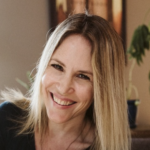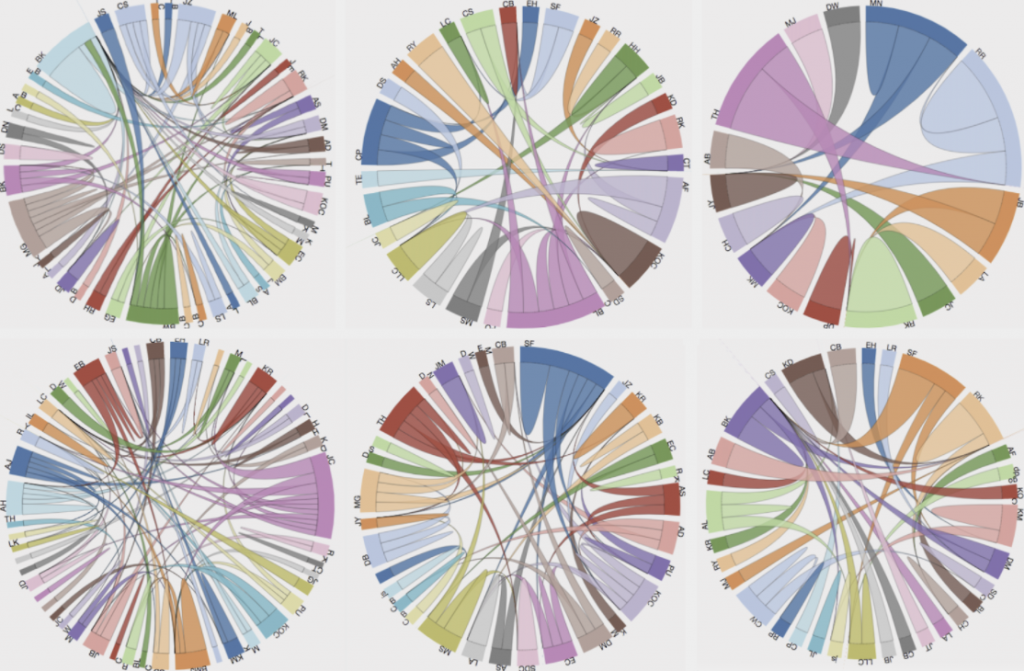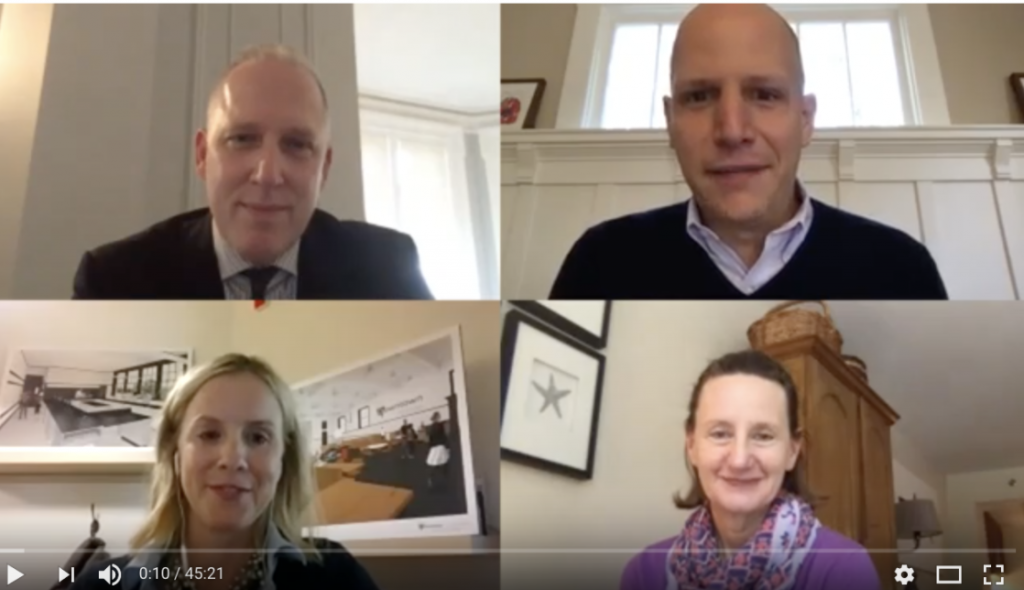Four Takeaways for Rethinking School
Rethinking School, GOA’s first ever professional learning online pop up course, wraps up today. 214 participants across 49 schools in 9 countries generated over 17,300 pageviews (and counting) in 6 days. What have we learned so far? How will this pop up course inform our professional learning work moving forward? Here are four of our most significant takeaways…so far.
Create opportunities to connect
The image above, generated by the application Threadz, visualizes interactions in some of the discussion forums. Each colored ribbon represents an educator connecting, asking questions about innovative practice, or sharing their own success and challenges transforming their classroom.
Now, we have an incredible collection of insights, conversations, and artifacts to review and share. Our participants have new relationships at different schools. While all of this is still fresh, I want to share what we’ve learned and, importantly, what’s next.
Spark conversation through inquiry
Six lofty and big questions drove the course:
- How might the design of assessments inform and foster student learning?
- How might teaching discipline-specific content in conjunction with deeper learning skills create new student learning experiences?
- How might the physical design of school spaces and places foster learning and collaboration?
- How might students drive or create their own learning?
- How might we leverage technology in the design of student-centered learning experiences?
- How might classroom, school, and curricular time be used to support students driving their own learning and working at their own pace?
Class discussions were organized around these themes, allowing participants to choose the question they most wanted to tackle and engage in conversation with likeminded colleagues.
We also received amazing questions from participants before the course even started. Panel moderator and GOA Executive Director Michael Nachbar used some participant questions to guide the conversation in the Rethinking School panel with Sue Belcher (The Downtown School: A Lakeside School), Dominic Randolph (Riverdale Country School), Patricia Russell (Mastery Transcript Consortium), and Jamie Steckart (THINK Global School).
Participant questions were essential and compelling:
- While we are bold innovators internally, our parents are having difficulty shifting their mindsets about education, especially when it comes to high school placement. They tend to be incredibly traditional and have outdated views on rigor and academic excellence. How do you articulate pedagogical shifts to parents, while maintaining their trust and confidence in the school’s process and direction?
- What would be the single most important change to secondary school education that you would insist upon if economic constraints and market forces were not a concern?
- What successful strategies have you seen implemented to help support change adverse faculty/school cultures through significant pedagogical/curricular/assessment changes at traditional schools?
- Many online courses and schools have revolutionized the availability and structure of traditional learning. Time has become more relative and less structured for students. What are your thoughts on time and rethinking schedules in brick and mortar schools? How should we use time to deconstruct the long established factory model of scheduling and grade levels in schools?
We hoped that by going broad, participants would go deep. And, boy, did they. Many schools and participants are already asking questions like this, and their interactions revealed we have much in common, no matter where our schools are.
Illuminate educator voices
One of the most rewarding elements of the course was hearing about new initiatives at schools around the world, watching teachers share resources, and compiling these ideas to share with a wider audience. Here are some of the educators who sparked important conversations in the course.
Eric Chandler, Kent Denver School: When we got down to thinking about the kind of teaching and learning that we wanted to do, we came to several realizations. First, all space should be learning space. (Hallways, for example, should not be transit zone for kids moving to and from ‘bells and cells’ classrooms.) Second, kids need to be active and moving around, so classrooms need size and flexible furnishing for different kinds of configurations of student learning and activity. Third, classrooms should be designed so students can break out (interesting word choice) into smaller collaborative groups.
Julia Coley, Windward School: Our intentionality must include re-thinking competencies and re-thinking how we engage parents and students in valuing those competencies. The goal is to guide students in their growth so they have access to what they want and what they need. Individualizing requires a starting point of common understandings.
Lara Cowell, Punahou School: I think students (and adults!) are happier, much more motivated, and engaged when we’ve genuine interest, audience, and purpose for our work. It makes sense to provide opportunities for choice, self-directed projects and research, and multiple means to demonstrate learning.
Kate Doemland, Miss Porter’s School: At the start of every school year I share this with essay colleagues. It’s an essay–not new–by William Cronon–called ‘”Only Connect…”‘ The Goals of a Liberal Arts Education,” and it reminds me that what we do matters; ultimately, it matters because we’re in the business of helping to shape meaning out of a chaotic human experience, find love, wrestle with the past, grapple with ambiguity, seek identity, and find a small place in the order of the universe.
Anna Liem, Punahou School: As a new director of professional learning, I’ve been noodling a lot over how to provide for our teachers the same types of learning that we want for our students: learning that’s relevant, impactful, ongoing, and personalized. As mentioned in the video, online asynchronous learning might be one way to do this.
David Peabody, University Prep: After reading your post and the replies, I’m going back to my Math team to ask them how we can have students reflect on their “failures,” and try to change our own outcome-oriented mindsets.
Laura Reysz, Park Tutor School: I am intrigued by anything different that will transform the way students learn and put more of the focus on them.
Paulette Unger, Christ Church Episcopal School: I was really struck by the how perhaps simple changes in language such as sharing with students “feedback” instead of “grades” might make a different in how they move forward. Developing and practicing this common language could help move students into action.
Ray Yang, University Prep: How can we get students to see the value in pursuing a path that does not work and reflecting on how that can help them problem solve and strategize towards improved outcomes?
John Yen, Polytechnic School: Our biggest challenge, and coincidentally our concept to redefine space, is throwing away traditional approaches to how learning spaces are defined, and thinking about space not as a place to define the learning, but to provide opportunity for the learning to define the space.
Inspire action
Today is the last day of the course. What are we learning and doing next? We are aware of the positives and pitfalls of conversation. If we are simply singing to the choir, our conversation may just be that- more people who are talking at each other and doesn’t necessarily equate to paradigm shifts.
At GOA, we think through deeply how to bring people together in a network that is, yes, online. We also strongly affirm the value of being together in person and will soon be announcing our summer place-based institute that will take place near Seattle (stay tuned for this announcement in early November!).
This week has been inspiring and engaging for the four of us who were facilitators (myself and also Jason Cummings, Susan Fine, and Michael Nachbar). Finally, we are in awe of the work that educators are doing, individually and collectively, to rethink school for and with students.
Don’t worry if you missed the pop up professional learning course. We plan to offer a new pop up course this spring. To stay up to date on GOA learning opportunities, sign up for our newsletter here.
Global Online Academy (GOA) reimagines learning to empower students and teachers to thrive in a globally networked society. Professional learning opportunities are open to any educator. To sign up or to learn more, see our Professional Learning Opportunities for Educators or email hello@GlobalOnlineAcademy.org with the subject title “Professional Learning.” Follow us on Twitter @GOALearning. To stay up to date on GOA learning opportunities, sign up for our newsletter here.


